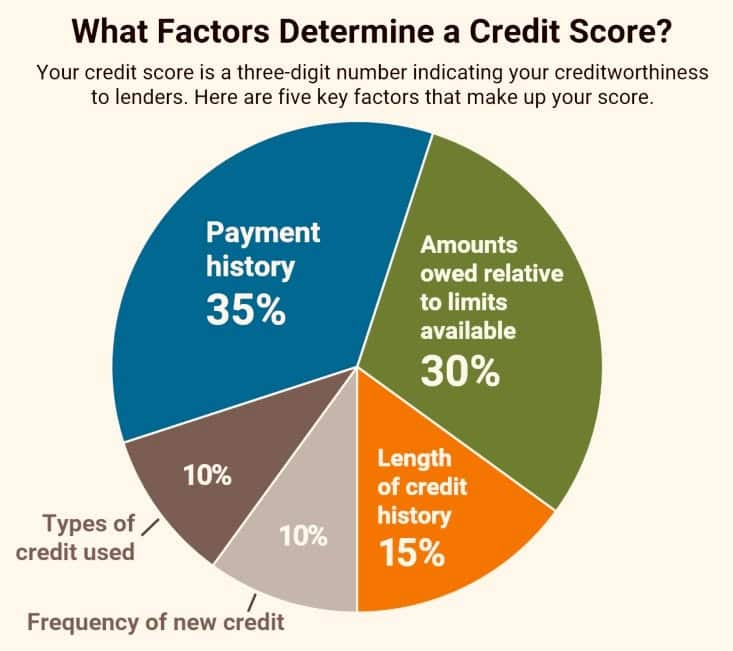Understanding the Basics of Credit History
Credit history is a record of a borrower’s responsible repayment of debts. It plays a significant role in determining a person’s ability to obtain new lines of credit and is one of the pivotal elements involved in decision-making processes by financial institutions.
The Composition of Credit History
A credit history is composed of various pieces of information, such as:
- The amount of available credit you are utilizing
- The length of your credit history
- The types of credit you have (credit cards, auto loans, mortgages, etc.)
- Recent applications for new credit
Understanding Credit Reports and Scores
Your credit history is summarized in the form of a credit report and is used to generate a credit score. The United States primarily utilizes the FICO and VantageScore models to calculate credit scores. Each lender may use a different scoring model, leading to slight variances in the scores.
Influences on Credit History
Positive behaviors that benefit your credit history include timely payments, having low balances, and a long credit history. Conversely, late payments, high credit utilization, or multiple recent credit applications can negatively affect your credit history.
How Credit History Affects Your Financial Life
Your credit history plays a pivotal role in shaping your financial life. It is a comprehensive record of your financial decisions and behavior over the years, including loans taken out, credit cards used, and payment diligence. Lenders, creditors, and sometimes even employers use this record as a metric to determine your creditworthiness and financial responsibility.
 Top 10 Proven Ways to Make Money Online: A Comprehensive Guide
Top 10 Proven Ways to Make Money Online: A Comprehensive GuideThe Impact of A Good Credit History
A positive credit history can open up various financially beneficial doors for you. Prospective lenders view a good credit history as proof of past financial responsibility, increasing your chances of obtaining credit at lower interest rates. This can result in substantial savings over time. Moreover, many landlords and service providers also consider your credit history during the application process. Having a good credit history can also give you a better chance for job advancement or higher salary negotiations.
The Drawbacks of A Bad Credit History
Conversely, a negative credit history can pose significant financial difficulties. Banks and other financial institutions may reject your loan or credit card application or offer them to you at a higher interest rate. The extra interest payments can quickly pile up, causing substantial financial burden in the long run. Additionally, prospective employers or landlords that review your credit history may perceive poor creditworthiness as a sign of irresponsibility or unreliability.
Improving Your Credit History
Improving your credit history is a long and steady process. It involves making timely payments, maintaining low credit utilization, and checking your credit reports regularly for inaccuracies. Over time, these steps can help you build a strong credit history, leading to reduced financial risks and more financial opportunities in your life.
Tips to Improve Your Credit History
Improving your credit history is a gradual and responsible process. Understanding how credit works is the first step you can take towards improving your credit score. This article aims to provide you with some surefire steps to take on this journey.
Pay Bills on Time
Paying your bills on time is one of the vital elements in improving your credit history. Your payment history impacts your credit score significantly, so ensure to set up reminders or automatic payments to avoid overdue bills. Creating a consistent payment history can positively affect your credit score.
 Top 10 Proven Ways to Make Money Online: A Comprehensive Guide
Top 10 Proven Ways to Make Money Online: A Comprehensive Guide Top Effective Ways to Make Money as a Teenager: A Comprehensive Guide
Top Effective Ways to Make Money as a Teenager: A Comprehensive GuideMaintain Lower Balances on Credit Cards
Try to maintain lower balances on your credit cards. High outstanding debt can negatively impact your credit score. It’s crucial to keep your balances low in relation to your overall credit limit. Also, avoid closing unused credit cards as part of a short-term strategy to improve your credit score.
Regularly Check your Credit Reports
- Checking your credit reports regularly can help you keep track of your financial footprint. It enables you to detect any unauthorized activities or errors in your report. If identified, these errors can be disputed and corrected, leading to a better credit score.
- The three main credit reporting agencies, Experian, Equifax, and TransUnion, are required by law to provide you with a free annual credit report. Utilize these services to keep track of your credit history.
Common Misconceptions About Credit History
When it comes to credit history, there are many common misconceptions that can lead to financial missteps. Understanding these myths can help you make more informed decisions about your financial health.
Misconception 1: Checking Your Credit Hurts Your Score
One common misconception is that checking your credit score frequently will damage it. This is not true – you have the right to check your credit report once a year from each of the three major credit bureaus, without it affecting your credit score. Checking your credit score regularly is a good habit, as it can help you identify any errors or fraud, allowing you to take action to protect your credit history.
Misconception 2: You Only Have One Credit Score
Another widespread misconception is that each person only has one credit score. In reality, there are many different credit scoring models, each with its own scoring range and criteria for calculation. Therefore, your credit score can vary depending on the model used. It’s crucial to understand this to prevent any inaccuracies or misuse.
Misconception 3: Closing Old Accounts Can Boost Your Score
Many believe that closing old or inactive accounts can improve their credit score. This is often not the case – in fact, it can have the opposite effect. Credit scoring models take into account the length of your credit history. Closing old accounts can shorten your credit age, which could potentially harm your credit score rather than help it.
 Top 10 Proven Ways to Make Money Online: A Comprehensive Guide
Top 10 Proven Ways to Make Money Online: A Comprehensive Guide Top Effective Ways to Make Money as a Teenager: A Comprehensive Guide
Top Effective Ways to Make Money as a Teenager: A Comprehensive Guide Understanding Finance: A Comprehensive Guide on How the Money System Works
Understanding Finance: A Comprehensive Guide on How the Money System WorksUnderstanding Credit Reporting Agencies and Your Credit History
Navigating the arena of credit reporting agencies can seem rather daunting to the uninitiated and novice borrower. These agencies, like Experian, Equifax, and TransUnion, are key institutions in the world of finance, tasked with keeping tabs on individuals’ credit history and behavior.
Their main purpose is to dissect financial habits and generate a credit report, which effectively becomes a statement of how reliable one is in repaying debts. These reports play pivotal roles in influencing decisions about loans, retirement plans, and even employment options.
The Role of Credit Reporting Agencies
Credit reporting agencies are essentially intermediaries, collecting data from various financial institutions, creditors, lenders, and then compiling this information into comprehensive credit reports. They track all your financial transactions and debt record—from your credit card bills to student or car loans—scrutinizing your methods and timeliness of debt repayment.
Your Credit History
Your credit history, as recorded by these agencies, can exert tremendous influence on your financial prospects. A stellar credit history can streamline loan approval, lower interest rates, and even aid in landing your dream job. On the other hand, a poor credit history can deter financial growth, bear higher interest rates, and limit your borrowing potential.
 Top 10 Proven Ways to Make Money Online: A Comprehensive Guide
Top 10 Proven Ways to Make Money Online: A Comprehensive Guide Top Effective Ways to Make Money as a Teenager: A Comprehensive Guide
Top Effective Ways to Make Money as a Teenager: A Comprehensive Guide Understanding Finance: A Comprehensive Guide on How the Money System Works
Understanding Finance: A Comprehensive Guide on How the Money System Works Top Strategies on How to Improve Your Credit History: A Comprehensive Guide
Top Strategies on How to Improve Your Credit History: A Comprehensive Guide